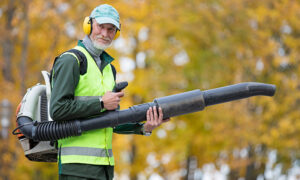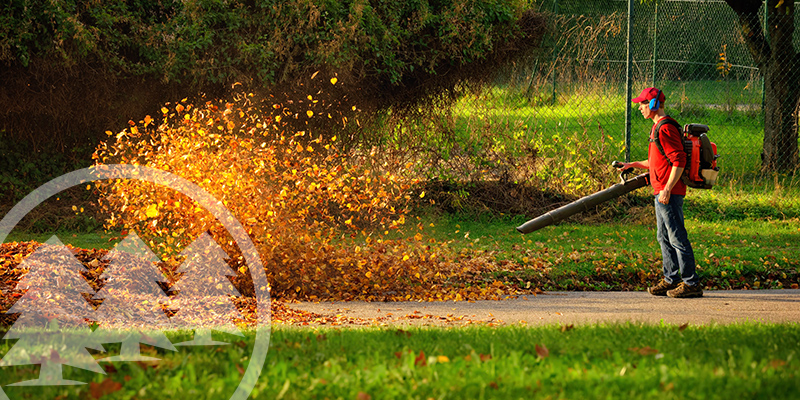Leaf blowers in HOA communities are not a surprising sight, especially in neighborhoods with lush foliage and large expenses of landscaping. While efficient, these blowers do tend to disrupt the peace and quiet. The resulting frustration and onslaught of complaints from homeowners can drive an HOA board to consider banning leaf blowers altogether, but is that something it has the power to do?
The Downsides of Leaf Blowers in HOA Communities
Leaf blowers make easy work of fallen leaves and debris. They allow homeowners and landscapers to spruce up yards or driveways without breaking a sweat. However, they also come with their fair share of pitfalls. These very pitfalls are the exact reasons why many HOAs dislike — and even outright ban — their use.
1. They Make a Lot of Noise
 The first and perhaps most important argument against leaf blowers is the noise they make. Noisy leaf blowers in HOAs don’t exactly create a peaceful environment for residents. To many people, they can even be a source of stress.
The first and perhaps most important argument against leaf blowers is the noise they make. Noisy leaf blowers in HOAs don’t exactly create a peaceful environment for residents. To many people, they can even be a source of stress.
The constant whirring of the engine, coupled with the loud blowing noise, is certainly enough to trigger a headache. Most people expect their HOA neighborhood to be quiet at certain hours, mainly between 9 p.m. and 8 a.m. With more and more people working from home now, though, that expectation extends to even morning and afternoon hours.
As if the stress and disruption are not enough, leaf blowers can also impair a person’s hearing. Constant exposure to just 70 adjusted decibels can cause permanent hearing problems, and leaf blowers register at 110. Although most people don’t fire up their leaf blowers daily, the risk still exists.
2. They’re Bad for the Environment
In addition to the extensive noise they make and the potential hearing damage they cause, leaf blowers are also terrible for the environment. Gas-powered leaf blowers, in particular, expel millions of tons of carbon dioxide every year. As many might know, carbon dioxide is a big contributor to climate change.
Homeowners associations can help the environment by limiting the use of gas-powered leaf blowers. This is one way HOAs can go green, which can also save them money in the long run.
Can HOAs Restrict Leaf Blowers?
First, it is important to check state and local regulations. Some cities have already banned gas-powered leaf blowers, including the District of Columbia. If there is an existing prohibition in the area, discussing whether or not an HOA can restrict them may be a moot point. However, not all cities have such regulations.
In general, an HOA may enact and enforce a rule that forbids leaf blowers, provided it is done correctly. An HOA may create such a rule under blanket nuisance provisions within the CC&Rs. Most communities prohibit nuisances, though such provisions are typically very broad. When in doubt, the HOA board should seek legal counsel.
Prohibiting Leaf Blowers in HOA Communities
If an HOA decides to prohibit leaf blowers, enacting the policy according to proper procedure is essential. Depending on whether it is simply a change in operating rules or an amendment to the CC&Rs, the proper procedure may involve a membership vote or a simple board resolution. Amendments to the CC&Rs usually require associations to get approval from homeowners. On the other hand, a change in operating rules usually only needs the board’s go-ahead.
An association should also decide whether to restrict only gas-powered leaf blowers or all leaf blowers in general. Gas-powered blowers normally make a lot of noise and contribute to pollution.
Additionally, if an HOA does prohibit leaf blowers, the rule should apply to everyone. It is a given that homeowners can’t use them. However, this rule also extends to the HOA itself and the landscapers the HOA or the homeowners hire.
Exploring Alternatives
Although most boards have the option to prohibit leaf blowers in HOA communities, this does not come with zero pushback. Some homeowners may fight their HOAs for the ability to continue to use leaf blowers. After all, they are efficient at what they do. In that case, some alternatives worth exploring offer a sort of middle ground.
1. Stick to Electric Leaf Blowers
One alternative is to permit leaf blowers, but only those that rely on electricity to run. Sure, electric leaf blowers are not as powerful as their gas-powered counterparts. However, they are less noisy and less harsh on the environment. They also tend to be cheaper and more portable.
It is worth noting that a requirement like this may place an undue burden on owners. Some experts believe such a rule may be unreasonable because owners will have to spend extra money on an electric blower when they already have a gas-powered one. As usual, asking a lawyer for advice is a good idea, as every HOA is different.
 2. Set a Schedule for Permitted Use
2. Set a Schedule for Permitted Use
Most residents’ primary issue with leaf blowers is the noise they make. To combat this, HOAs can enact a rule allowing leaf blowers to run between certain hours and on specific days. This way, HOAs can limit the noise to a particular window. Moreover, homeowners know what to expect and plan for those times.
Avoiding Liability: Leaf Blowers in HOA Communities
The general consensus is that HOAs can enforce a properly enacted rule restricting leaf blowers. However, associations can still face liability issues, especially against particularly headstrong homeowners. To limit their exposure to legal problems, HOAs should consult a lawyer if doubt remains. Hiring an HOA management company can also help.
Cedar Management Group provides expert management services to homeowners associations and condominiums. Call us today at (877) 252-3327 or contact us online to get a free proposal!
RELATED ARTICLES:
- Pickleball In HOAs: Yay Or Nay?
- HOA Backyard Rules: What Can And Can’t Homeowners Do
- 9 HOA Springtime Landscaping Rules For The Community






